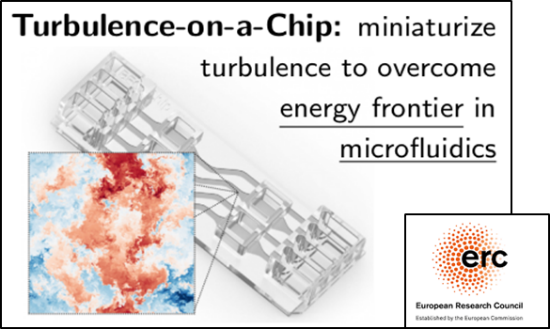GReCEF- Grup de Recerca en Ciència i Enginyeria de Fluids
Lluis Jofre
Head of Research Group (GReCEF)
lluis.jofre@upc.edu

I study the Fluid Mechanics of complex multiscale systems, such as multiphysics turbulence, multiphase flows, thermo-fluid phenomena, interfacial hydrodynamics, and micro/nano flows. These types of problems are encountered in a wide range of fundamental and applied systems in engineering, physics, chemistry and biology. Their understanding and modeling is challenging as they are characterized by coupled processes active at multiple separate scales. The research approach feeds from the emerging paradigm of Predictive Science & Engineering, which combines experiments, theory and computational models, together with the uncertainties encountered at the different phases, to gain knowledge and make predictions in complex scientific and engineering problems. Additional information can be found at https://sites.google.com/view/lluisjofre.

Joan Grau joan.grau@upc.edu
Ricardo Torres ricardo.torres@upc.edu

 Our research focuses on the study of transport phenomena, encompassing both experimental and computational techniques, as well as data science. Our primary interests lie in physical and mathematical modeling, computational simulation, and experimental validation. Additionally, we employ machine learning and data-driven modeling approaches to analyze multiscale problems in fluid mechanics. These strategies aim to enhance the accuracy of predicting the dynamic behavior of complex systems, where the interactions between mass, momentum, energy, and charge transport are vital in various phenomena across disciplines such as physics, chemistry, and biology. Furthermore, these techniques find applications in diverse areas, including applied technologies and engineering. Notable examples of phenomena we investigate include turbulence, microfluidics, flows in porous media, and reactive flows. Ultimately, our objective is to gain a deep scientific understanding of fundamental phenomena and apply this knowledge to improve the design and manufacturing of devices and machines, equipping them with advanced functionalities.
Our research focuses on the study of transport phenomena, encompassing both experimental and computational techniques, as well as data science. Our primary interests lie in physical and mathematical modeling, computational simulation, and experimental validation. Additionally, we employ machine learning and data-driven modeling approaches to analyze multiscale problems in fluid mechanics. These strategies aim to enhance the accuracy of predicting the dynamic behavior of complex systems, where the interactions between mass, momentum, energy, and charge transport are vital in various phenomena across disciplines such as physics, chemistry, and biology. Furthermore, these techniques find applications in diverse areas, including applied technologies and engineering. Notable examples of phenomena we investigate include turbulence, microfluidics, flows in porous media, and reactive flows. Ultimately, our objective is to gain a deep scientific understanding of fundamental phenomena and apply this knowledge to improve the design and manufacturing of devices and machines, equipping them with advanced functionalities.

Francesco Capuano
francesco.capuano@upc.edu

My research is focused on developing high-fidelity and robust computational techniques for modeling and analysis of multiscale / multiphysics problems in engineering and biological systems. Particular emphasis is given to physics-compatible methods for scale-resolving simulations of turbulent flows, cardiovascular biomechanics, and biological fluid dynamics.
In the context of cardiac mechanics, for instance, I combine fundamental biomechanical principles, computational modeling and advanced medical imaging to gather fundamental understanding into the patho-physiological role of intracardiac flows, with the ultimate aim of deriving novel physics-based biomarkers with enhanced diagnostic and prognostic capabilities.

Francesc Font
francesc.font@upc.edu

My primary training is in the development and application of mathematical models in a cross-disciplinary setting. I work at the interface between mathematics, physics and engineering. To date, I have worked on topics such as lithium-ion batteries, nanoscale heat transfer and phase change, capture of contaminants and cell motility and pattern formation. I have made significant contributions on the formulation and analysis of mathematical models describing phase change phenomena. The research developed in this topic has contributed towards our understanding of phase change at the limits of continuum theory. Currently, my research interests have expanded towards using mathematics to tackle environmental challenges. In particular, I am very interested in the formulation of mathematical models describing transport phenomena in porous media for applications such as capture of CO2 from the atmosphere or in the storage of hydrogen in metal hydrides for green energy production technologies.

Attila Husar
Head of Research at the UPC-Hydrogen Laboratory
attila.husar@upc.edu

Universitat Politècnica de Catalunya (UPC) operates a state-of-the-art hydrogen laboratory at its Besos Campus in Barcelona, Spain. This specialized facility is dedicated to research and development in the field of green hydrogen technologies. The laboratory is equipped with advanced equipment and infrastructure to support hydrogen production, storage, and utilization studies. We investigate novel catalysts and materials for efficient electrolysis processes, study hydrogen storage methods including hydrogen compression and liquefaction, and evaluate the performance of fuel cells for energy conversion. The laboratory also provides a platform for conducting experiments on the integration of hydrogen systems into existing infrastructure. The UPC hydrogen laboratory serves as a hub for collaboration with industry partners, government agencies, and other research institutions. It enables researchers to work closely with stakeholders to develop innovative solutions and promote the practical implementation of hydrogen technologies. This “Living Lab” is a unique facility where all the hydrogen needed for the lab is self-produced and the data from the production system will be available online. More info at: https://cerh2.upc.edu/.

Mario Valero
mario.valero@upc.edu

Dr. Valero’s research focuses on thermofluid dynamics, specifically on fire science and the study of fire behavior, including both enclosure and wildland fires. Fire behavior analysis and modeling requires the detailed characterization of numerous multiphysics and multiscale coupled phenomena. Measuring all those phenomena simultaneously with the required level of detail is virtually impossible, whereas resolving all required spatial and temporal scales in models is computationally unfeasible. These challenges provide a fun and exciting playground to test and develop some of the most advanced methods available at present in science and engineering. Dr. Valero’s current main line of research focuses on the development of remote sensing, data science, and data-driven modeling techniques to measure and predict wildfire behavior. Other active areas of research include the characterization of model uncertainties, the optimization of multi-physics CFD models and the use of multifidelity schemes to speed up Monte-Carlo modeling strategies built upon physics-based models. Dr. Valero currently maintains research collaborations with multiple academic institutions in Europe and USA. He is part of the European Network on Extreme Fire Behavior COST Action and he participates in the Fire and Smoke Model Evaluation Experiment (FASMEE), an international interdisciplinary collaborative effort led by the US Forest Service. He also collaborates with NOAA and NASA in wildfire monitoring campaigns in the US.

Ferran Garcia
fernando.garcia-gonzalez@upc.edu

I am interested in the development of advanced tools from nonlinear science and dynamical systems theories. This has allowed me to demonstrate new routes to chaos for dissipative nonlinear systems with symmetry. I have implemented novel algorithms for the numerical computation of unstable fluid states allowing the investigation of coherent structures and transition to turbulence in the geo- and astrophysical context. My research is genuine and focuses in the analysis of hydrodynamic and magnetohydrodynamic instabilities. Thanks to this, I have been awarded by two prestigious postdoctoral fellowships (FSMP, AvH) and a best poster price at the Fundamental and Applied MagnetoHydroDynamics, 11th PAMIR conference, promoted by the International Association for Hydromagnetic Phenomena and Applications and the Institut d'Ingénierie Univ. Grenoble Alpes. I have a large expertise in multiphysics and multiscale fluid dynamics complex phenomena. I have developed a three-dimensional numerical code for the simulation of 3D geophysical and astrophysical flows in rotating spherical geometry. The code has allowed me to make relevant contributions in the understanding of planetary dynamos and the gas giant atmospheres.
Jan Mateu
jan.mateu@upc.edu

Professor at the Fluid Mechanics department of UPC and team leader of the Air Quality Services research group in the Barcelona Supercomputing Center (BSC). His research explores urban air quality modelling from an interdisciplinary perspective, with special attention to uncertainty quantification and data assimilation.
His current interests focus on (i) developing robust air quality models at the street scale using deterministic and stochastic methods to address the short-term forecast, diagnosis for
health impact assessments, and scenario planning; (ii) generating valuable evidence to be exploited by scientists and decision-makers to guide the ecological transition of urban air quality; and (iii) making available flexible methodologies using open-source data to offer scalable solutions to any city.
Joan Calafell
joan.calafell@upc.edu

Professor at the Fluid Mechanics department of UPC and team leader of the Air Quality Services research group in the Barcelona Supercomputing Center (BSC). His research explores urban air quality modelling from an interdisciplinary perspective, with special attention to uncertainty quantification and data assimilation.
His current interests focus on (i) developing robust air quality models at the street scale using deterministic and stochastic methods to address the short-term forecast, diagnosis for health impact assessments, and scenario planning; (ii) generating valuable evidence to be exploited by scientists and decision-makers to guide the ecological transition of urban air quality; and (iii) making available flexible methodologies using open-source data to offer scalable solutions to any city.
Javier Príncipe
javier.principe@upc.edu

Juan Carlos Simo award from the Spanish Society of Computational Mechanics and Computational Engineering (SEMNI) to young researchers, is professor at the Fluid Mechanics department of UPC and research professor at CIMNE. His main expertise is the formulation of finite element methods for partial differential equations with strong emphasis on fluid mechanics problems and the study of relation between numerical and physical modelling of turbulent flows, the development and implementation of scalable preconditioners to exploit high performance computing architectures and of uncertainty quantification methods. He was co-founder and developer of FEMPAR, a scientific software library for the massively parallel numerical solution of partial differential equations that demonstrated scalability up to 500,000 cores. He has been scientific coordinator of the European project ExaQUte (2018-2022) that involved 8 European partners and has been PI in several projects funded by the Spanish Ministry of Science and Innovation (MCIN) and technology transfer contracts with private companies. He is currently PI of the AMBBOS project funded by MCIN and part of the research team of the Severo Ochoa project recently awarded to the CIMNE by MCIN.





Comparteix: